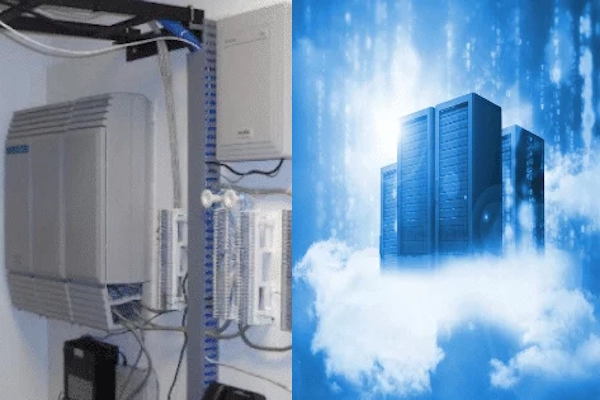Blog
Resources, advice and articles related to business telephony
Stay up to date with our latest feature launches, and explore tips and best practices straight from the experts.
Traditional Phone System (PBX) versus Cloud PBX

Previously, a company wishing to acquire a telephone system had to make a significant capital investment. The main manufacturers; Avaya (Nortel, Lucent), Mitel, Toshiba, Panasonic, etc., provided a host of equipment offering more or less similar functionality, however incompatible with each other. This equipment was complex to maintain, requiring expensive specialized labor. Too often businesses were struggling with an aging, under-programmed and feature-limited phone system.
Open standards have enabled the development of Internet-based communications services and protocols. These innovations have brought new cloud-enabled technologies to business telephony systems.
Here are the 5 benefits of a cloud-based business phone system:
1. Cost-Savings
The use of voice over IP technology, the consolidation voice and data onto the same network infrastructure, and the elimination of annual support and maintenance costs allow companies to achieve significant savings in their communications costs. In addition, the subscription model provides a lower total cost of ownership compared to traditional phone systems.
2. Simplicity
Cloud-based telephony systems allows companies to take control of their solution and adapt it to their needs without having to resort to specialized technicians. This advantage eliminates the associated expense and makes rapid change possible.
3. Flexibility
A cloud-based telephony solution is inherently elastic and can scale up or down as the business needs changes. It allows employees to connect from anywhere to stay in touch with their customers and suppliers. They benefit from all the features whether they are in the office, telecommuting or on the road.
4. Reliability
Unlike traditional on-premises telephone systems, a cloud-based telephony solution is designed to be more resilient to Internet and/or telephone service interruptions, power failures or technical failures of electronic components. Business continuity is an important aspect in selecting your cloud telephony service provider, see this article for details.
5. Features
A cloud PBX (or virtual telephony system) does not require any addition or replacement of equipment (modules, expansion cards, software, etc.) when a business needs new functionality. Improvements and new features of a cloud solution are automatically offered to all users.
In summary
Traditional on-premises telephony systems are mature solutions, however the market trend shows that it dated and are no longer suited for today’s business needs.
In addition to reducing costs, cloud-based telephony solutions offer features and functionality that enable SMB to enjoy benefits that were previously only available to large enterprises.
Contact an S2T specialist today for advice on your next business phone system.
Open standards have enabled the development of Internet-based communications services and protocols. These innovations have brought new cloud-enabled technologies to business telephony systems.
Here are the 5 benefits of a cloud-based business phone system:
1. Cost-Savings
The use of voice over IP technology, the consolidation voice and data onto the same network infrastructure, and the elimination of annual support and maintenance costs allow companies to achieve significant savings in their communications costs. In addition, the subscription model provides a lower total cost of ownership compared to traditional phone systems.
2. Simplicity
Cloud-based telephony systems allows companies to take control of their solution and adapt it to their needs without having to resort to specialized technicians. This advantage eliminates the associated expense and makes rapid change possible.
3. Flexibility
A cloud-based telephony solution is inherently elastic and can scale up or down as the business needs changes. It allows employees to connect from anywhere to stay in touch with their customers and suppliers. They benefit from all the features whether they are in the office, telecommuting or on the road.
4. Reliability
Unlike traditional on-premises telephone systems, a cloud-based telephony solution is designed to be more resilient to Internet and/or telephone service interruptions, power failures or technical failures of electronic components. Business continuity is an important aspect in selecting your cloud telephony service provider, see this article for details.
5. Features
A cloud PBX (or virtual telephony system) does not require any addition or replacement of equipment (modules, expansion cards, software, etc.) when a business needs new functionality. Improvements and new features of a cloud solution are automatically offered to all users.
In summary
Traditional on-premises telephony systems are mature solutions, however the market trend shows that it dated and are no longer suited for today’s business needs.
In addition to reducing costs, cloud-based telephony solutions offer features and functionality that enable SMB to enjoy benefits that were previously only available to large enterprises.
Contact an S2T specialist today for advice on your next business phone system.
